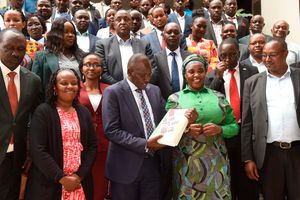
Kenyan currency notes of different denominations.
Regimes, current and past, hide behind explanations such as wars in Ukraine, and Gaza, high international oil prices, and drought, when confronted by citizens angry at the escalating cost of living.
Explaining is the easy part. The real job is taking actions that make life better for the citizens.
To be fair, there are no quick fixes to the escalating cost of living. Regimes cannot make rain (although some claim to), stop wars in foreign shores, or control oil prices.
But they can make the right policy choices, in the right sequence. In a crisis, governments can provide short term relief to citizens, while simultaneously undertaking longer-term structural changes. Here is why and how.
Inflation has taken on a strong upward long-term trend, nearly doubling over the last seven years, the Central Bank’s interventions on seasonal variation notwithstanding.
The effect is a persistent erosion of real incomes. That is why we feel worse off with each succeeding year.
Large and growing structural fiscal deficits are the likely root cause of this trend. Since 2006, governments have lived beyond their means, spending more than the nation can raise in taxes. That choice has set off the following chain reaction.
Inflation is too much money chasing too few goods. To reduce it, CBK slows down total spending in the economy by making money more expensive. But increasing government spending is at odds with these efforts, attracting criticism for policy confusion.
This has three effects. High interest costs, higher taxes, and less credit to productive sectors.
To manage inflation, CBK has maintained high interest rates for three years. Fortunately for them, recent rains have also led to a good food supply. The result of both, inflation is down to 4.4 per cent, the lowest it has been since September 2019. But high interest rates have meant expensive, and since quarter 1, shrinking credit to the productive sectors.
By not dropping the policy rate, the CBK seems to confirm the accusation of some economists that the real purpose of high rates is to attract money to finance the large deficits.
Currently, the government is offering a whopping 15.77 per cent for 91-day treasury bills. Rising interest costs are hurting both farmers and businesses, who find themselves crowded out of the credit market, slowing down production.
Seasonal variations in inflation are driven by food and fuel prices. These prices are determined by rain, and international oil supply respectively.
The resolute action required of government is not just to mitigate the seasonal variations, but to reverse the long-term upward trend. Both require serious changes – increased irrigated food production and, a switch to alternatives to oil.
Increasing food production needs more than subsidised fertiliser. This policy has been around though three successive administrations with poor results. Corruption and logistical inefficiencies are frequent.

A portion of land under large-scale farming in South Sudan
In addition to fertilizer, farmers need seasonal credit for other inputs, and commercial loans are too expensive for them to make a profit.
Total loans to private sector are shrinking and Agricultural Finance Corporation, the specialised lender of agricultural seasonal credit, too small to really make a difference.
Transition to irrigated agriculture must be brought back on track. Prior efforts by this and earlier administrations have stalled over corruption and rent-seeking, leading to over pricing of dams. The Kimwarer and Arror dams are the most infamous examples.
Switching to alternatives such as e-mobility needs strong incentives to attract necessary investment for the infrastructure needed. These investments will of course create much needed jobs. The government should use their renewed appetite for Chinese relations to access electric vehicle technology. In particular, they should offer incentives for such vehicles to be produced locally by those seeking entry into the Africa Continental Free Trade Area.
CBK prefers us to think that the exchange rate is freely determined by market forces.
That said, the management of the exchange rate must be in-sync with the policy choices on food and fuel.
A strong shilling helps short-term. For instance, using the duty-free window granted the previous December, food imports, in dollar terms, were up 36 per cent, year to August last year. But the 25 per cent depreciation of the shilling during the same period cancelled out the cost reduction effect of the duty-free window. The same was true for petroleum.
A strong shilling, however, hurts exports. Buyers of Kenyan made goods and services will find it more expensive, therefore buy less. Although it is a price, the exchange reflects policy choices.
An attractive environment increases foreign direct investments and portfolio inflows. Both have traditionally kept the shilling relatively strong.
The country imports more goods and services than it exports. But capital flows usually compensate for the trade deficit. Creating a favorable environment for EV manufacturers would attract such flows, create jobs and reduce reliance on oil.
That attractive environment must promote and support domestic production. With the latter declining on the back of rising cost of financing, we are back to too few goods for the level of money supply. High interest rates creates further contraction, undermining tax collection.
Policy choices need to be the right ones, be coherent, consistent and synchronized. Foreign policy must support domestic interests. The renewed dalliance with China should be about investments and technology, not more debt.
@NdirituMuriithi, an economist, is a partner at Ecocapp Capital












